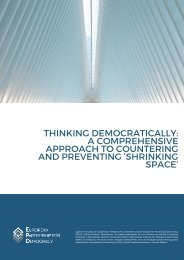Repression and resilience: Diagnosing closing space mid-pandemic
You also want an ePaper? Increase the reach of your titles
YUMPU automatically turns print PDFs into web optimized ePapers that Google loves.
40 REPRESSION AND RESILIENCE: DIAGNOSING CLOSING SPACE MID-PANDEMIC<br />
Guatemala<br />
Space for contestation in Guatemala was most intensely defined by the deepening institutional breakdown <strong>and</strong><br />
widening rift between the executive on the one h<strong>and</strong>, <strong>and</strong> anti-corruption <strong>and</strong> human rights bodies on the other.<br />
Following the undermining <strong>and</strong> later expulsion of the International Commission against Impunity in Guatemala (CICIG),<br />
strong allegations of fraud in the election of judges for the Supreme Court of Justice <strong>and</strong> Courts of Appeals further<br />
aggravated the institutional crisis. Inertia prevailed in the Congress of the Republic during a crucial period, as orders of<br />
the highest judicial authority were not complied with, opening up a huge institutional void of accusations, legal actions<br />
<strong>and</strong> injunctions.<br />
The COVID-19 p<strong>and</strong>emic has greatly aggravated these structural conditions through the imposition of presidential rule<br />
by means of exceptional measures, which limited constitutional guarantees <strong>and</strong> authorised the use of public force. While<br />
the ‘state of calamity’ measure limited the public’s fundamental freedoms <strong>and</strong> enabled the executive to use certain<br />
state resources, the ‘state of siege’ measure made the President the comm<strong>and</strong>er of the army. The combination of these<br />
two exceptional measures empowered the security forces to intervene in any organisation, dissolve demonstrations<br />
or public meetings, <strong>and</strong> arrest any person without a warrant. This further inhibited the - already limited - ability <strong>and</strong><br />
willingness of the judicial <strong>and</strong> legislative branch to oversee the executive.<br />
Civic <strong>space</strong> was most acutely targeted with restrictive laws <strong>and</strong> violence ahead of <strong>and</strong> during the p<strong>and</strong>emic. Together<br />
with the President, Members of Congress were already leading the attacks on civic <strong>space</strong> before the p<strong>and</strong>emic, with<br />
proposals for an NGO law, a law allowing for the arbitrary criminalisation of organised groups of people, <strong>and</strong> a law<br />
criminalising the right to free expression amongst others. This set of repressive laws (called the anti-Maras laws) was<br />
proposed ahead of the p<strong>and</strong>emic, but interestingly legislators did not pass these laws at a time of limited oversight<br />
due to the p<strong>and</strong>emic.<br />
The most acute attacks on civic <strong>space</strong> consisted of the major increase in aggressions against human rights defenders<br />
<strong>and</strong> civil society during the p<strong>and</strong>emic. During the first half of 2020, the country counted as many aggressions against<br />
human rights defenders as the whole year of 2019, including defamation campaigns, legal complaints <strong>and</strong> even<br />
murders. In parallel, a number of key human rights institutions were closed down, including the Presidential Commission<br />
on Human Rights <strong>and</strong> the Presidential Secretariat for Women.<br />
Attacks on civic <strong>space</strong> were further exp<strong>and</strong>ed to the digital sphere, with targeted disinformation <strong>and</strong> smear campaigns<br />
discrediting institutions <strong>and</strong> spreading suspicions of fraud, for instance regarding the CICIG. This was facilitated by<br />
Morales’ netcenters - companies set up or sponsored directly by the government to disseminate such disinformation -<br />
<strong>and</strong> by the monopoly on public broadcasting <strong>and</strong> radio.<br />
Colombia<br />
In Colombia, the p<strong>and</strong>emic gave a political rallying cry to the unpopular ruling party. With daily television appearances<br />
<strong>and</strong> a state of emergency, the government found a new way to accumulate power <strong>and</strong> override Congress <strong>and</strong> the<br />
courts, while keeping public opinion on its side. As the government was unwilling to support the implementation of<br />
the peace process, the p<strong>and</strong>emic also provided an excuse to shift the budget for the peace process to the p<strong>and</strong>emic<br />
response, further delaying the peace deal’s implementation. The Minister of Defence also suggested that it is time

















